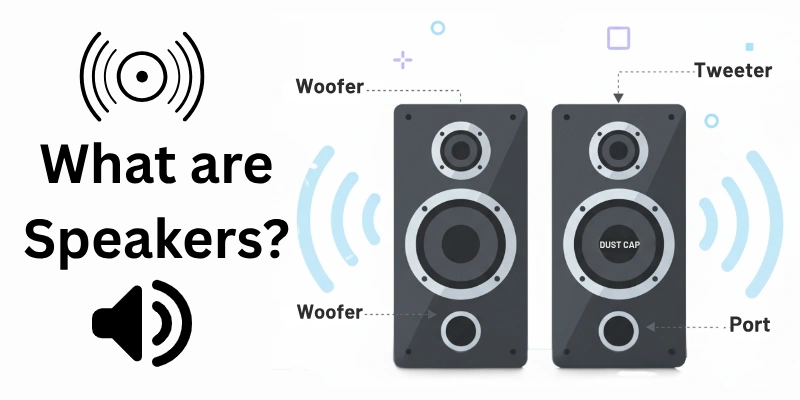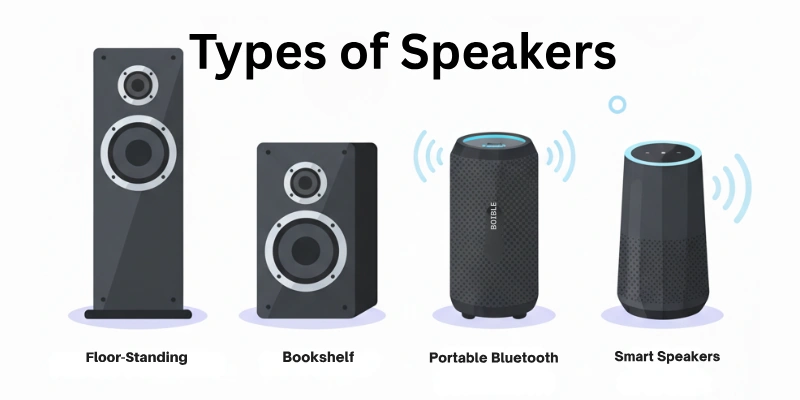What Are Speakers? Complete Guide with Examples
Published: 30 Sep 2025
Did you know that the speakers you use today have changed the way we experience sound? Whether it’s listening to music, watching movies, or participating in virtual meetings, speakers play a crucial role in our daily lives.
These devices turn electrical signals into audible sounds, making them essential in our modern technology.
In this article, we will explore the basics of speakers, how they work, the different types available, and how to choose the right one for your needs.
What are Speakers?
Speakers are devices that make sound from electrical signals. When you play music or watch videos on your devices like phones or computers, these signals are sent to the speakers. The speakers then turn these signals into sound that you can hear through vibrations in the air.

They come in different sizes and shapes, but their job is always to make sure you hear the sound clearly.
History of Speakers
Speakers have a history that goes back over a hundred years. They were first invented in the late 1800s when scientists figured out how to turn electrical signals into sound waves. These early speakers were simple and used for things like telephones.
Over time, as technology advanced, speakers became more powerful and better at reproducing sound accurately. In the 20th century, they became essential for radios, TVs, and later on, computers and smartphones.
Today, speakers continue to improve, becoming smaller, more efficient, and capable of producing high-quality sound for all kinds of devices.
How Do Speakers Work?
Speakers work by converting electrical signals into sound that we can hear. They have a few important parts that make this happen.
Components of a Speaker
A speaker has a few main parts:
A cone or diaphragm, a magnet, and a voice coil. The cone is usually made of a flexible material like paper or plastic. It moves back and forth when electrical signals pass through the speaker.
Sound Production
Here’s how it works:
When you play music or a video, the electrical signals go to the voice coil. This coil is like a wire wrapped around a cylinder. The electrical signals make the coil move because of magnetism. This movement pushes and pulls the cone, which vibrates (moves back and forth) very quickly. These vibrations make waves in the air, which we hear as sound.
So, speakers take the electrical signals from your devices and turn them into sound through the movement of their parts.
Types of Speakers
Speakers come in different types, each designed for specific purposes. Here are the main types:

- Bookshelf Speakers: Small speakers usually placed on shelves, good for small rooms.
- Floor-standing Speakers: Tall speakers that stand on the floor, known for powerful sound.
- Soundbar: Long, thin speakers used with TVs to improve sound quality.
- Subwoofer: Speaker for low, deep sounds like bass in music or explosions in movies.
- Portable Speakers: Small speakers you can carry around, often used with phones or tablets.
Each type of speaker has its own strengths, depending on where and how you want to use it. To learn them in detail click here!
Speaker Technologies
Speakers have evolved with different technologies to suit various needs and preferences:
- Wired Speakers: These are traditional speakers that connect directly to devices using wires.
- Wireless Speakers: These use technologies like Bluetooth or Wi-Fi to connect to devices without wires.
- Smart Speakers: These speakers are capable of more than just playing music. They can link to the internet and have AI helpers such as Siri or Alexa. They can answer queries, control smart home devices, and so on.
- Surround Sound Systems: With these systems, speakers are put all over the room to make the sound more realistic.
Factors to Consider When Buying Speakers
When buying speakers, there are several important factors to keep in mind to make sure you get the best sound experience.
1. Sound Quality
Sound quality is crucial because you want your speakers to produce clear and accurate sound. To evaluate it, listen to different speakers if you can, and check reviews for comments on sound clarity, bass, and volume.
2. Size and Space
The size of the speakers and the space you have available will affect your choice. Bigger speakers usually produce more powerful sound but need more space. Smaller speakers can fit in tight spaces but might not sound as full.
3. Power and Sensitivity
Power is measured in watts and tells you how loud the speakers can get. Sensitivity is about how efficiently the speakers use power. Higher sensitivity means louder sound with less power. Look for a good balance between power and sensitivity for your needs.
4. Compatibility
Make sure the speakers are compatible with your devices. Check if they have the right connections (like Bluetooth, Wi-Fi, or wired inputs) and if they work well with your phone, computer, or TV.
5. Budget
Balancing budget and quality is important. Set a budget and look for speakers that offer the best sound quality within that range. Sometimes spending a little more can get you much better performance. Look for sales or discounts to get good deals.
How to Set Up Speakers
Setting up speakers correctly can make a big difference in how they sound.
Here’s how you can do it:
1. Placement Tips
Put your speakers in the right spots for the best sound. If you have two speakers, place them at the same height and angle them slightly towards where you will be sitting. Keep them away from walls to avoid echo.
2. Connecting to Devices
To connect your speakers, first find the right cables. For wired speakers, plug one end of the cable into the speaker and the other into the device (like a TV or computer). For wireless speakers, turn on Bluetooth or Wi-Fi on your device, find the speaker’s name in the settings, and connect.
3. Calibration
Calibration means adjusting your speakers for the best sound. Some speakers have buttons or dials you can turn to change the bass. You can also use the settings on your device to adjust the sound. Play some music and make small changes until it sounds just right to you.
Maintenance and Care
Taking good care of your speakers will help them last longer and sound better.

1. Regular Cleaning
Dust your speakers regularly with a soft, dry cloth. Avoid using water or cleaning sprays, as they can damage the speaker. For the speaker grills, you can use a vacuum cleaner with a brush attachment to gently remove dust. Keep your speakers in a clean and dry place to prevent dust and moisture from getting inside.
2. Troubleshooting Common Issues
Sometimes, speakers might not work properly. Here are some common problems and how to fix them:
- No Sound: Check if the speakers are properly connected to the device. Make sure the volume is turned up on both the speakers and the device.
- Distorted Sound: This can happen if the volume is too high. Lower the volume and see if the sound improves. Check the connections to ensure they are secure.
- Intermittent Sound: If the sound cuts in and out, check for loose cables. If you are using wireless speakers, make sure there are no hurdles blocking the signal and that the battery is charged.
Conclusion
So guys, it’s time to wrap up everything we’ve talked about! In this article, we covered “What is a Speaker” in great detail, from their simple definition to how you can maintain your speakers so they stay reliable for a long time.
Remember, choosing the right speakers depends on factors like sound quality, size, power, compatibility, and budget. Setting them up properly and taking good care of them will ensure they work well and last long.
If you have any questions, feel free to ask in the comment section. We’re here to help!
FAQs
Here are some of the most commonly asked questions related to computer speakers.
Speakers are used to make sound from devices like phones, TVs, and computers louder. They let you hear music, movies, or calls clearly. Without speakers, you would not be able to enjoy audio in a room. They are important for entertainment and communication.
There are many types of speakers for different needs. Bookshelf speakers are small and good for rooms. Floor-standing ones are big and powerful. Soundbars are slim and fit under TVs. Subwoofers add strong bass, and portable speakers are easy to carry.
You can connect speakers to a computer with a cable. Most use a 3.5mm jack or USB port. Some speakers connect without wires using Bluetooth or Wi-Fi. Just pair or plug them in, and they are ready to play sound.
First, check if the speaker is connected properly. Make sure the volume is up on both the computer and the speaker. Also, check if the sound settings are correct. Sometimes restarting the device can fix the problem.
Place your speakers in a good position, not blocked by objects. Adjust the sound settings on your device for better clarity. Keep the speakers clean from dust. Using good-quality audio files also improves sound.
Clean your speakers gently with a soft dry cloth. Keep them away from water and moisture. Do not use strong cleaning sprays. Store them in a safe, dry place to make them last longer.

- Be Respectful
- Stay Relevant
- Stay Positive
- True Feedback
- Encourage Discussion
- Avoid Spamming
- No Fake News
- Don't Copy-Paste
- No Personal Attacks

- Be Respectful
- Stay Relevant
- Stay Positive
- True Feedback
- Encourage Discussion
- Avoid Spamming
- No Fake News
- Don't Copy-Paste
- No Personal Attacks





